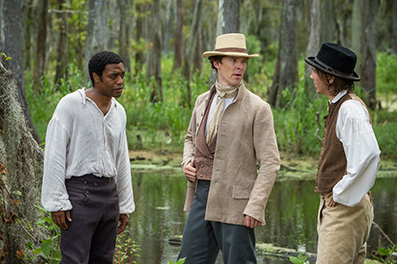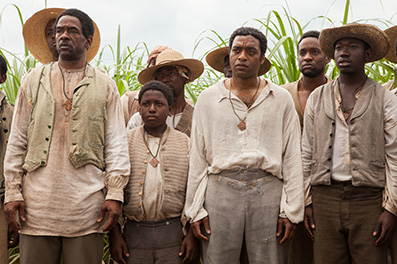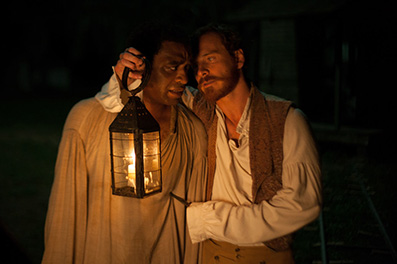"Chiwetel Ejiofor was the only man to play this role. There's a certain
kind of stature, a certain kind of presence he has and a certain kind of
humanity that I needed in the environment that he had to go through." |
Director, Steve McQueen |
Oh, boy (and there's the sound of flinching from a cut, air drawn backwards through clenched teeth). Even that word 'boy' is loaded in this context. This is a real tough movie to review for several very obvious reasons (I suspect this is a 'film' rather than a movie). It's hard watching people mistreat people to a horrific degree (Yes, I know they're 'just' pretending). It's hard watching profoundly ignorant people being unmindful that the colour of skin bestows no status of inferiority or superiority. It's hard to see despotic bastards point their fingers at the justification for their hideous debasements; what else but the fecking Bible. It's hard to see this film as 'entertainment' per se but it's also hard to see it as purely an artistic but difficult history lecture (there are many testaments to its historical veracity). It's hard not to banish the low and unworthy thought that this film exists to intensify white liberal guilt. However, it's all too easy to see the passion behind the project and that may be enough to thrust it to the top of this year's heap, that and the Academy's chronic attraction to films of perceived worth. 12 Years A Slave is one man's story and if there's a flaw contaminating any or all of the emotional wallops that the film delivers, it's that while 'a slave' is liberated after twelve years, millions stayed and died in slavery so while we are thrilled that Solomon Northrup finds his way home, we really are forced to think of those he left behind. This may even be director McQueen's point. It's been reported that there were 'exuberant test screenings' last year; exuberant; characterized by lively energy and excitement. OK, I can see that those moved by Northrup's story would be enthusiastic to praise it and pass on the good word but there is no getting away from it. Like The Passion of the Christ, this is a film whose DNA is intense suffering with little in the way of light relief (not that I'm asking for that or suggesting that this kind of film should provide it; on the contrary). One wrong gesture or misstep and the cold, cruel spell cast over the entire venture is compromised. This truth hurts even if a film could never hope to convey the real-time horror of what is was like to live a lifetime of debasement, abuse and enslavement; or even twelve years.

Solomon Northrup's memoir tells the story of a respectable, free man in the 19th century living in New York State making a living as a carpenter. The civil war is three decades off yet. Do I need to say that his skin is black? While his family was away, he was convinced to join a pair of travelling players on tour with a circus in Washington. After a week of performances, Northrup is drugged and awakes in chains. So begins his 12 years as a slave being passed from one Louisiana slave owning family and its cotton plantation to the next. Let's not understate his situation and remind ourselves that lesser men would have succumbed to overwhelming despair. This is an environment where death is often seen as a preferable choice. Northrup holds on to his humanity and is witness to and a victim of the barbarism, debasement and terrible indifference that one colour had for another in those poplar tree-lined avenues of the old South. The story is told mostly linearly with a few diversions in time that are easily understood. Despite how heartfelt the telling and how magnificent the performances (by God, are they just), there's nothing here we've not seen before. Yes, it's a true story (this always adds a frisson) and by all accounts McQueen has been faithful to the book (not that this is, in itself, a virtue when it comes to a film adaptation). But all events, the signatures of slavery if you will, featured in other movies that tackled the issue are here - the lynchings, the whippings, the rapes, the breathtaking abuse and the chattel-like treatment of the underclasses. But what sets 12 Years apart is its indomitable earnestness (not always an appropriate mantle for a film to lay claim to but 12 Years wears it very well – McQueen's shoulders are both figuratively and literally broad). According to media reports (trust them at your peril), it also aspires to be taken as an artistic work. Now, this could be simply because McQueen is an established artist outside of the film business and a lot of journalists will seek to tie the two facts together. 'A' is an artist. 'A' makes a movie; therefore the movie 'A' makes must be an art film. Faulty logic. But when a ball is rolling the way 12 Years is right now, to blanche at and bet against its good fortune 'buzz' wise, seems to be a bad bet to place.
There is no doubt about the buzz surrounding 12 Years A Slave. As we trundle into the Awards season, McQueen and company have already started picking off the shiny fruits from the lower branches and I dare say the major awards are within reach of this remarkable film. At the very least Ejiofor is a major contender as well as his director. He's on screen for almost the whole running time and is mesmeric and moving in equal measures. Ejiofor's eyes tell us gradually, softly but with searing directness, everything we need to know about his state of being. This is naturalistic acting at its finest. There are two moments that break the heart; one, after a fellow cotton-picker has succumbed to an early death, a song is sung at his graveside. You can see the 'free man apart' suddenly realize that he is now affiliated with the slaves whether he likes it or not and sings lustily, falling in with what he is now and casting off what he used to be. It is a breaking point that Ejiofor plays as a strength, something I found remarkable. There's dignity in being united with a working class. Now where have I read that before? McQueen is not averse to showing Ejiofor in mid shot in long silent takes where we are invited to look deeply into his eyes and see the churning emotions whirling within. Secondly, there is Northrup's reunion with his family (that cannot be a spoiler as the title infers he will be free or dead – if he dies, how did he write the novel?) Ejiofor wrings every last ounce of remorse, guilt, joy and grief while holding his wife and it's a flint-hearted bastard that doesn't shed a tear with him. However outstanding the leading man, the supporting cast more than measure up to the bar set by Ejiofor.

There's little doubt that Lupita Nyong'o (Patsey) is in with a great chance of scoring a few gongs. Her heartfelt and utterly despairing performance as the slave at the focus of Michael Fassbender's tyrannical shit's beguilement is so true, you're never aware you're watching a film. She manages to portray perfectly the anguish and subsequent need for death that Northrup will not allow her (he has good reasons). There is some ambiguity in the adaptation from book to screen over this event. In print, it's stated that Epps's wife had asked Northrup to kill Patsey. How anyone could harbor any jealousy over Fassbender's Epps is a mystery of our time. Patsey's whipping, the nastiest scene of the film by some margin, is almost unbearable to watch. Hats off to a splendid supporting cast; an odious Paul Giamatti selling flesh and casting families asunder; a soft hearted slave owner Ford, Benedict Cumberbatch, who is responsible for saving Northrup's life by selling him on to the biggest bastard out there, nice one Sherlock; Cumberbatch's employee, an even more odious Paul Dano who has it in for Northrup. With the exception of Game Of Thrones' King Joffrey, I have never wanted a character on screen to die a more horrible death than Dano's whip-wielder. Fassbender, of course, is coldly and chillingly brilliant as the loathsome Edwin Epps. Epps is dangerous but so is Fassbender. You can see some real fear in a lot of the reactions he tears from people from his demon-eyed, drunken rages. The fact Sarah Paulson (Sorkin's Sunset Strip's comedienne) has him on such a tight leash is not necessarily a good thing. In her own way, she's actually worse when it comes to the treatment of those in her workforce.
If nothing else, 12 Years is an acting Masterclass, one that will reward those seeking to learn how to convey emotional truth. Speaking of emotion, let's single out another noteworthy facet of the film that came from a most unexpected source. The quiet and affecting score is written by none other than Hans Zimmer, the heir apparent to Jerry Goldsmith's crown and reigning giant of big budget movie composition. How McQueen got him on board is a story I would love to hear one day. How he could afford him is another tale altogether. To his credit, his work is poignant and emotionally resonant. It's neither showy nor archly sentimental. I'd say Zimmer pitched his work at exactly the frequency McQueen needed to squeeze as much from the story as possible. Bravo.

Slavery, to most people, is not a contentious issue. It's simply inhuman, morally repugnant and a part of biblical history that is beyond shameful. Yes, it's not even been eradicated from London's multicultural metropolis and I'm sure it's endemic worldwide where people still regard the acquisition of wealth and power as more important than their fellow human beings (which is probably everywhere as depressing as that supposition is). But there is a significant difference between slavery as a backdrop for a blood-lashed romp (thank you Mr. Tarantino) and a film like 12 Years that doesn't push our noses in to the blood and sweat but certainly holds us in place at the window. Its terrifying normality consistently disgusts so there is a question to be asked, an awkward one to be sure. Why subject yourself, as an audience member, to the lowest form of humanity as entertainment? Can we possibly actually enjoy 12 Years? In the States, it's been reported as a cathartic experience. It's not an enjoyable film. It's admirable, superbly made and above all, challenging in the best sense. After an altercation with the hired help, Northrup finds himself at the end of a noose with just inches separating him from the ground. His tiptoe dance is distressing (we know he will survive but still...) not least because 'normal' life goes on around him, fear playing its part keeping everyone cowed. And then just when you're saying to yourself "That's enough, my God, make it stop..." McQueen introduces an angel who brings Northrup water but he's still dancing for his life. This is one of the best and brilliantly sustained sequences in the film – the near death of a man brought low by others' greed suddenly becoming an absurd mirror-ball dancing and reflecting the shards of normality around him. We are invited to be stunned by the indifference of others and then forced by cinematic attrition to understand it in the terrible context of its time and place. This is typical of the film and overall it's a hard watch but brilliant cinema nonetheless. If you like your dramas historically accurate, brutally terrifying and deeply affecting, I wholeheartedly but cautiously recommend it.
Postscript:
There's one final piece of ironic trivia to mull over. McQueen was allegedly heckled at the New York Critics Circle Awards while receiving a gong for best director. The alleged heckler, the CityArts (sic) Editor from the New York Review of Culture, shouted abuse that McQueen either ignored or didn't hear. In a double eyebrow raise, the name of the heckler was 'White' (the world is a strange place, isn't it?) Ready for the other eyebrow? Mr. White is black. To lend a little balance to the rabid and to me surprising across the board appreciation of 12 Years A Slave, I invite you to read the other side of the coin, the review written last October by Mr. Armond White himself who seems to be a contentious figure in East Coast reviewing circles. The link to the review is after his final lines that should give you a flavour of what to expect.
"Steve McQueen's post-racial art games and taste for cruelty play into cultural chaos. The story in 12 Years a Slave didn't need to be filmed this way and I wish I never saw it."
http://cityarts.info/2013/10/16/cant-trust-it/ |